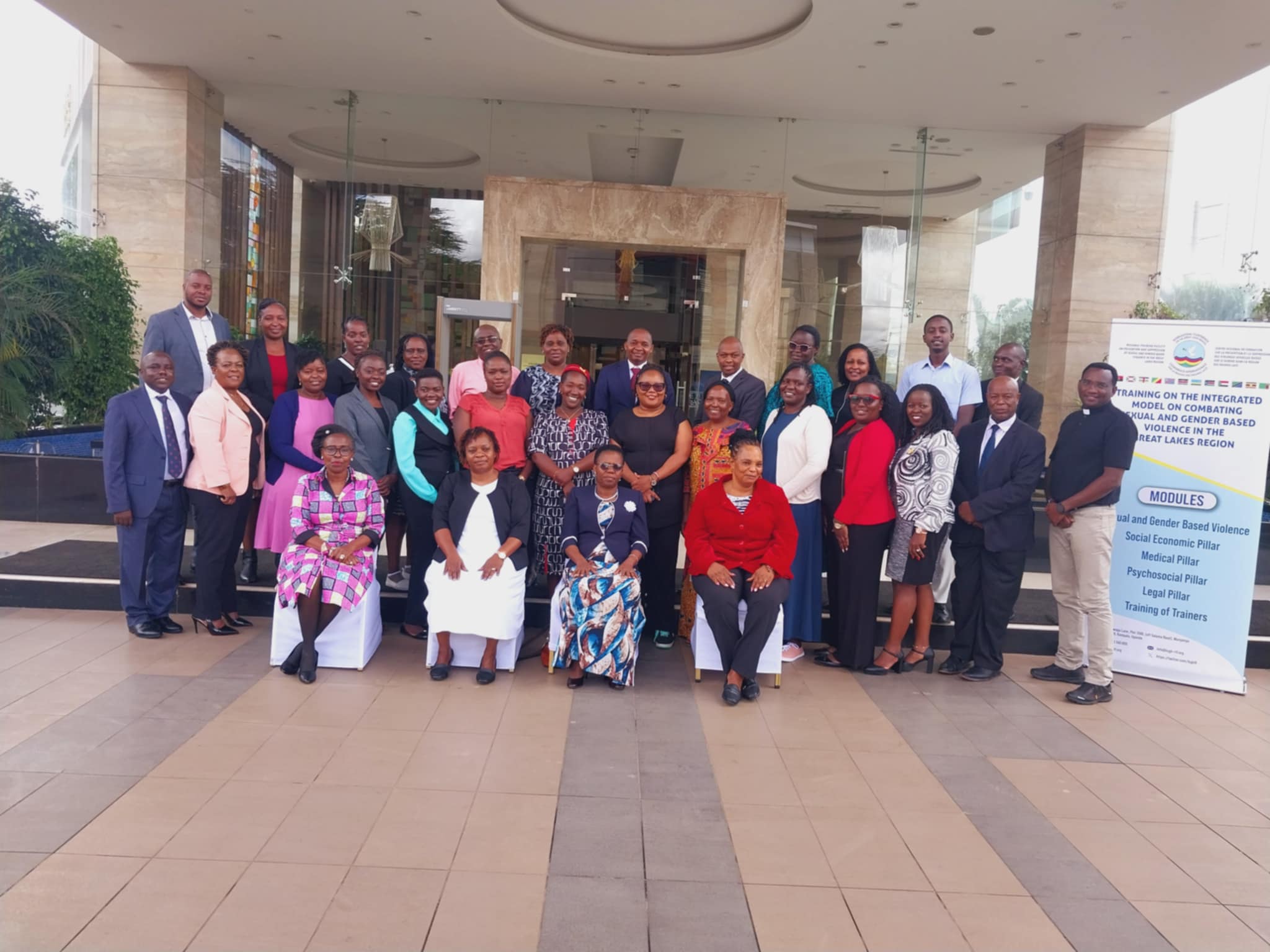 Participants pose for a group photo during the anti-Sexual Gender Based Violence regional integrated model workshop at a Nairobi Hotel on April 24, 2025/GEORGE OWITI
Participants pose for a group photo during the anti-Sexual Gender Based Violence regional integrated model workshop at a Nairobi Hotel on April 24, 2025/GEORGE OWITIKenya has been recognised for its effective laws in combating Gender-Based Violence (GBV).
Dora Kanabahita, Research and Knowledge Expert at the International Conference on the Great Lakes Region (ICGLR)—Regional Training Facility (RTF) for the Prevention and Suppression of Sexual Gender-Based Violence, praised Kenya’s legal framework and best practices, noting that other member states could adopt many of them.
“In Kenya, you have good, comprehensive laws—those on witness protection, the prohibition of Female Genital Mutilation, and laws guiding care services. Going forward, there are lessons we can learn from each member state,” Kanabahita said.
She addressed the media on Thursday during the regional workshop on the integrated model for addressing Sexual and Gender-Based Violence, held at a Nairobi hotel.
The RTF on SGBV, based in Kampala, was established in 2014 under the ICGLR Protocol on the Prevention and Suppression of Sexual Violence against Women and Children.
Its mandate is to train and sensitise police officers, judicial officials, medical personnel, social workers, and other professionals handling cases of sexual violence.
The ICGLR is committed to promoting peace, security, stability, and development across its member states, which include Burundi, the Democratic Republic of the Congo, Ethiopia, Kenya, Malawi, Mozambique, Rwanda, Tanzania, Uganda, and Zambia.
“We commend Kenya for establishing the Policare Centre, which provides essential services and resources under one roof,” Kanabahita said.
Referring to the Kampala Declaration on stigma removal, Kanabahita urged people to come forward and help expedite care services.
“We are here to introduce an integrated model for addressing GBV,” she explained.
Kanabahita said the model combines two frameworks:
The Socio-Ecological Model – This focuses on various levels such as the individual, family, community, organizations, and society. It examines how different factors influence GBV and access to care.
The Holistic Model— This multi-sectoral approach addresses legal, psychosocial, medical, and socio-economic aspects of GBV. It also emphasizes mental health and psychosocial support, which she noted had previously been neglected.
She cited abuse of power, climate change, terrorism, and technological misuse as contributing factors to GBV.
“When we apply the socio-ecological model, we analyze how these various factors interact and influence GBV cases in our communities,” she said.
Kanabahita highlighted the use of human rights-based, trauma-informed, and victim-centered approaches across the Great Lakes Region, noting that countries are adopting effective practices to combat GBV.
Janvie’re Ndirahisha, Director of the ICGLR–RTF, emphasized that many GBV cases stem from abuse of power, gender inequality, and inadequate legal implementation.
“A human rights-based approach is crucial, where individuals—regardless of gender—understand and value their right to live free from violence,” Ndirahisha said.
She identified physical, economic, emotional, sexual abuse, and harmful cultural practices as forms of GBV.
Gender Principal Secretary Anne Wang’ombe described sexual and gender-based violence as “one of the most pressing human rights issues of our time.”
In a statement delivered by Deputy Director of Gender Emilly Opati, Wang’ombe said the workshop aims to strengthen regional cooperation in fighting SGBV across the Great Lakes Region.
“Sexual and Gender-Based Violence remains one of the most severe human rights violations, primarily affecting women and girls but also impacting men, boys, and other vulnerable groups,” Wang’ombe said.
She noted that the region has experienced complex challenges—including conflict, displacement, and socio-economic inequalities—that heighten the risk of GBV.
The PS emphasized the need for a multisectoral and integrated response involving governments, civil society, development partners, and faith-based organisations.
“In conflict and post-conflict settings, SGBV exacerbates vulnerabilities and hampers peacebuilding and recovery efforts. As signatories to UN Security Council Resolution 1325 on Women, Peace and Security, we must address these injustices through prevention, response, and a survivor-centered approach,” she stated.
Wang’ombe reaffirmed Kenya’s commitment to ending SGBV, highlighting several key initiatives, including:
The revised National Policy on GBV (2014)
The Sexual Offences Act
The National Action Plan on Resolution 1325, including the development of Lab 3
She added that the government has established GBV recovery centers and safe houses, and is currently working on standardizing guidelines for safe houses across the country.


![[PHOTOS] Ruto at Pope Francis' burial](/_next/image?url=https%3A%2F%2Fcdn.radioafrica.digital%2Fimage%2F2025%2F04%2F844cb891-abd4-4ee5-bc2d-2a0c21fa3983.jpeg&w=3840&q=100)






